‘The million-dollar question of this election’: Women’s health startups are confronting a shifting legal landscape

After a full day of meetings at Julie, a startup that sells a morning-after pill, CEO Amanda E/J Morrison jumped a flight from New York to Boston and headed to a small, private college, where a trivia night awaited her. Dozens of students shuffled into a classroom with plates of chicken tenders, Texas toast, and bright blue boxes of the emergency contraceptive.
Morrison had worked with the Planned Parenthood Generation Action club at Suffolk University to sponsor the event, part of Julie’s efforts to win a new generation of consumers. However, she had another, more pressing reason for being there. Julie is doing more campus events to clear up some of the confusion about emergency contraception — namely, that it isn’t medication abortion.
Standing at the head of the classroom, Morrison read off a projector screen, “Emergency contraceptives like Julie are legal in how many states? 25, 48, 50, 37.” Students tapped their answers into a quiz app. “It’s 37,” Lily, a spirited sophomore, whispered to her teammates.
In a minute, the correct answer appeared on screen, and the quiet chatter rose to a clamor. Half the teams said 37 states.
“Fifty states, guys. It’s everywhere,” Morrison said.
When asked why she said 37, Lily said, “Just the way things are going.”
In states that outlaw abortion, some patients and politicians worry that contraception could be in legal jeopardy, too. There’s no federal law preserving access to birth control, rather, a patchwork of state laws and court decisions holding it in place. Another Trump term could change that.
For Julie, “that’s the million dollar question of this election,” Morrison said.
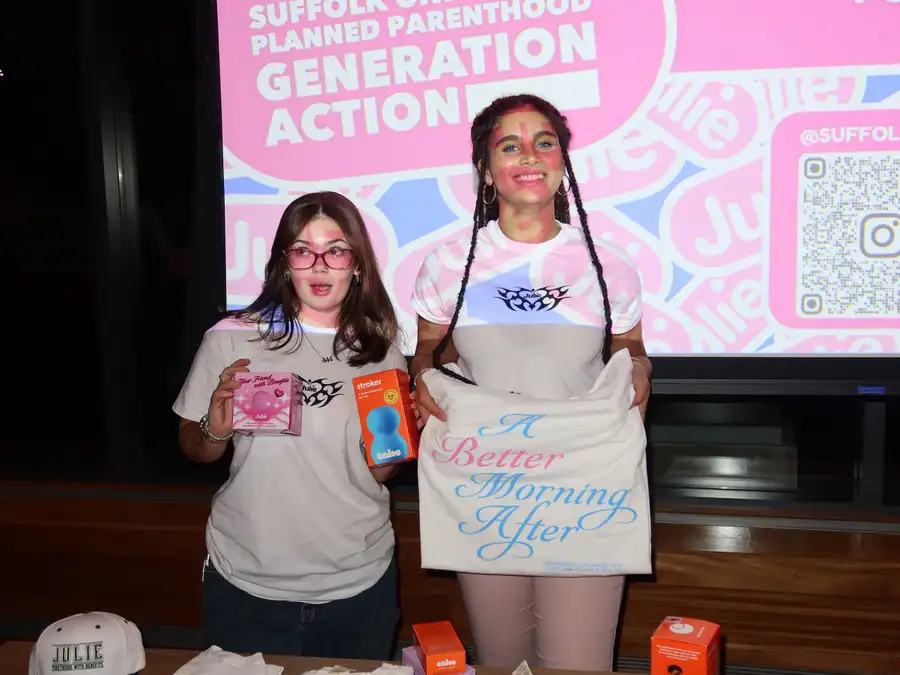
Students with the Suffolk University chapter of Planned Parenthood Generation Action hold up prizes at a trivia night hosted by Julie, an emergency-contraception startup.
“We’re not worried about some big ban happening in the first hundred days. But how those decisions trickle down — what is presented in Congress as a bill, how the Supreme Court reacts, what trickles down to the states — becomes a real secondary concern,” she said.
Founders of women’s health startups feel doubly invested in this election, one of the closest presidential races of the century. Half a dozen founders and investors of women’s health companies, all women, told B-17 that if Vice President Kamala Harris wins, it’s business as usual. They said another Trump victory creates uncertainty for reproductive health startups, from period trackers to online abortion clinics to embryo banks.
While Harris’s presidential campaign has been marked by unrelenting support for reproductive healthcare, including contraception and abortions, Trump’s position has been a moving target.
The former president suggested in May that he was “looking at” restrictions on birth control, then walked that position back in a social media post later that day. During the September presidential debate, he called himself a “leader” on IVF, a move that angered parts of his base that have sought to restrict fertility treatments. He said in October that he’d veto a national abortion ban after deflecting the question for months but would support states ordaining their own abortion bans.

For startup Julie, the legal status of emergency contraception is the “million dollar question of this election,” said Amanda E/J Morrison.
Trump’s waffling on reproductive rights has put founders of women’s health startups on notice. “It is one of the major issues that we’re discussing and that our CEOs are focused on — how to continue to provide care to women, especially women of childbearing age,” said Trish Costello, founder of Portfolia, an investing platform that pools money from female accredited investors.
The day after the presidential debate, Mika Eddy was vibrating with the weight of the election. The race’s outcome could drastically change reproductive rights, foreign policy, gun safety, and climate law — all issues close to Eddy, a 35-year-old Californian and mother of two.
But Eddy also has skin in the game as the chief executive officer of Malama Health, a startup helping women with gestational diabetes access better care. Its doula network assists patients on Medicaid with applying for benefits such as diabetes-friendly meals and medical transport.
Eddy worries that if Trump wins, he would restrict access to the coverage and benefits that her users rely on, weakening one of Malama Health’s key services.
“There is this common misperception that, ‘we’re in California, we’re in a liberal state, and so we’re safe.’ And I don’t think that’s the case,” Eddy said.
For some founders of women’s health startups, this election is more than a political contest; it has ramifications for their livelihoods. With so much at stake, they’re planning how to handle a scenario where states or courts might impose more limits on reproductive rights.

Kamala Harris wants Congress to pass a national law codifying access to abortion.
Hey Jane is a telehealth startup that connects patients to medical providers who offer online appointments and delivers abortion pills to their doorsteps. A year after the Supreme Court overruled Roe v. Wade, ending the constitutional right to abortion, Hey Jane started selling birth control and treatments for urinary tract infections, yeast infections, and herpes, both oral and genital. The new products cushion the business against a “plan E” scenario of a national abortion ban, said Carli Sapir, a Hey Jane investor and founding partner of Amboy Ventures.
“We’re thinking about how to make sure those other verticals are in a good place to continue carrying the company forward,” said Sapir.
This time last year, one of Hey Jane’s rivals, Choix, shut down after three years in service. The company said in a press release that “the stigma and politics surrounding abortion care posed significant fundraising challenges.” It raised a $1 million seed round in 2022.
While direct providers of abortion, like Hey Jane, could see major restrictions or shutdowns to their core businesses if Trump returns to the White House, a wider range of companies expect to feel the ripple effects. Startups that seem removed from the front lines, such as those involved with period tracking and fertility treatments, are also preparing for potential challenges.
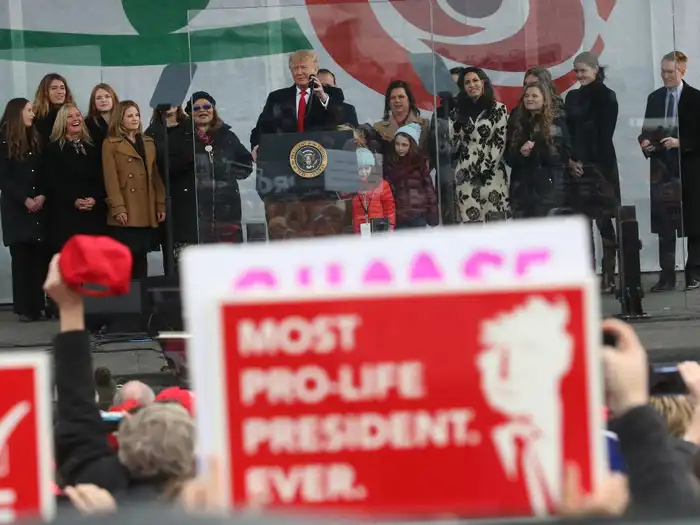
In 2020, Donald Trump became the first sitting president to attend the anti-abortion “March for Life” rally.
If a national abortion ban were to occur, apps like Flo Health or Clue might face increased scrutiny, according to Deena Shakir, a general partner at Lux Capital. These apps track when women have their periods and when they miss them. In today’s post-Roe America, privacy experts worry that such data could be used to suggest that someone has had or is thinking about having an abortion, potentially putting women at risk of prosecution in certain states.
The stakes could be equally high for companies involved with fertility treatments.
The demand for services like in vitro fertilization, or IVF, and surrogacy has been climbing for years as people have kids later in life and infertility rates increase. That’s birthed a global fertility market that includes companies that operate clinics to provide services like egg freezing and IVF, companies that run labs and tests, and firms that help people pay for the procedures.
However, the industry’s future is uncertain following attacks on abortion access. The end of Roe v. Wade opened up the legal terrain for states to interfere with access to other reproductive care, said Lauren Berson Sugarman, founder and chief executive officer of Conceive, a startup that offers personalized fertility guidance, including text support from nurses and peer groups.
In Alabama, the state Supreme Court ruled that frozen embryos should be considered children. That put patients and fertility clinics on edge that they could be criminally charged for destroying extra embryos. A handful of Alabama clinics paused IVF treatments while patients throughout the South began moving their embryos to jurisdictions with more stable legal protections.
“We see a lot of patients come to us and say, should I move my embryos out of a red state? Because what happens if they come after IVF?” said Berson Sugarman.
The push for “embryo rights” could have wide-reaching repercussions for startups like Maven Clinic or Carrot Fertility, which offer fertility benefits for employers, and TMRW Life Sciences, a biotech company creating robots for the safe storage of frozen sperm, eggs, and embryos.
Moreover, it could influence the type of research that startups conduct and where. Alice Zheng, a principal at women’s health investor RH Capital, explains how the shifting legal landscape might affect companies like Vitra Labs. As a biotech startup working on developing eggs from stem cells for IVF, “they’re doing really cutting-edge research for fertility, but they need to think very carefully about where they set up shop,” Zheng said. “Some of their research might involve certain types of tissue, which is more closely scrutinized in some areas than others.”
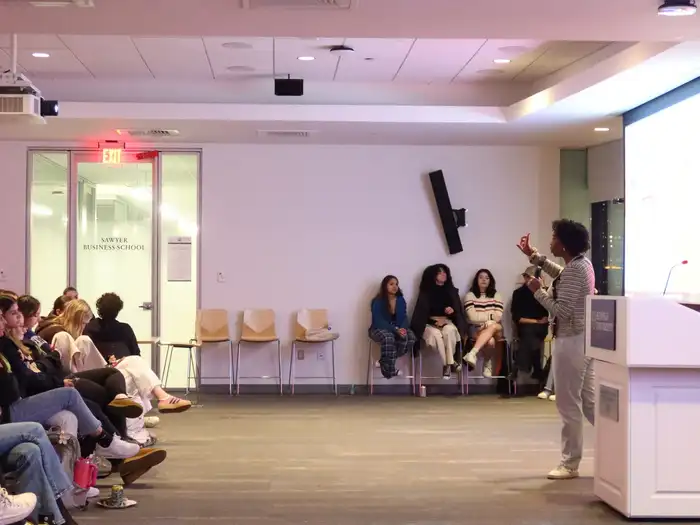
While emergency contraception is not the abortion bill and is currently legal in all 50 states, it is continuously confused with the abortion pill, which can have damaging consequences.
Two years ago, in the hours after the Supreme Court ended the constitutional right to an abortion, Morrison’s phone started ringing and didn’t stop. Investors wanted to know if the ruling would kill Julie’s launch in Walmart stores that fall. Job candidates wondered if the company would still exist in six months. Morrison’s mom called, concerned for her daughter’s future.
“For probably two weeks straight, I was just doing reassurance calls,” Morrison said.
While emergency contraception is not the abortion bill and is currently legal in all 50 states, it is continuously confused with the abortion pill, which can have damaging consequences. In June, the medical journal JAMA Network Open published a study that found retail pharmacy fills of Plan B, a leading morning-after pill brand, fell by 65% in states with near-total abortion bans the year after the Dobbs decision, partly due to clinic closures and confusion about its legal status.
That confusion could threaten Julie’s sales, and puts the onus of the company to better educate consumers. It sponsors events like trivia nights and sorority house brunches. It has enlisted TikTok influencers to share videos of their drugstore hauls showing how easy it is to buy Julie. In one video, a young woman going back-to-school shopping walks off with a two-count pack of the emergency contraceptive pill. The caption reads, “double majors, not double strollers.”

Julie reaches a new generation of consumers with its campus events.
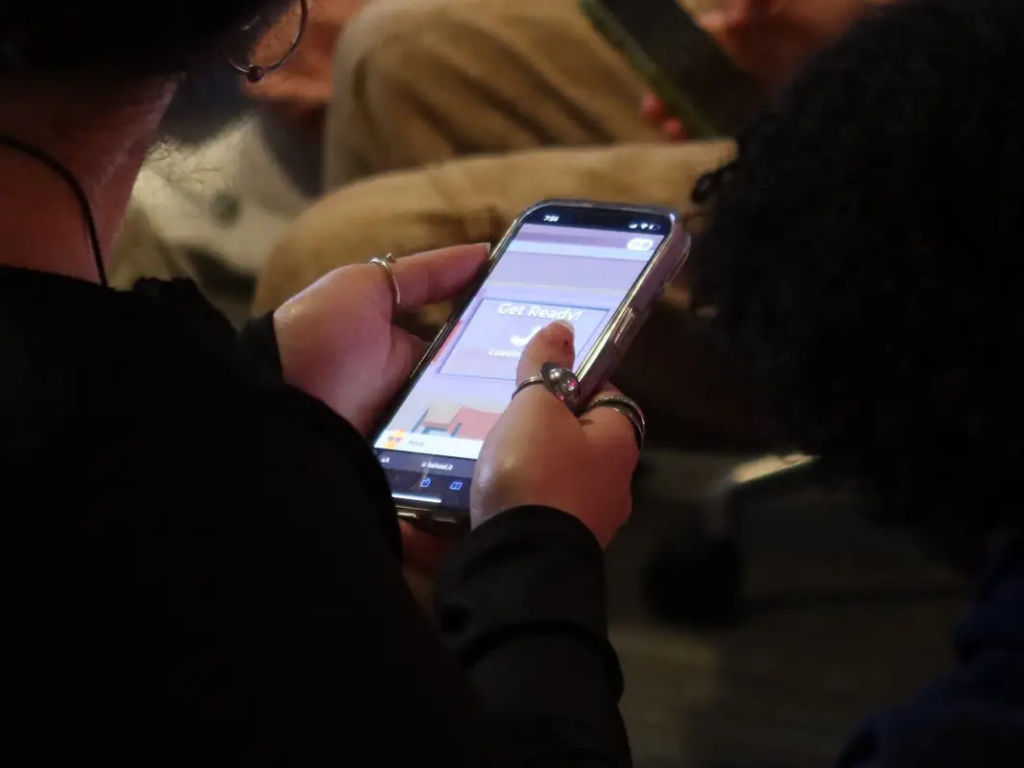
Students played reproduction-related trivia for prizes like sex toys and Julie swag.
Other startups are urging consumers to fight for reproductive rights at the polls. Eddy’s Malama Health has reminders to register to vote in its app and will tell users where their nearest polling station is closer to election day. The company asks for their ZIP codes during onboarding, Eddy explained.
“When you have a baby, you’re like, ‘I want to vote, but I don’t know where to go,'” Eddy said. She hopes the emails will get more pregnant women and new moms to head to the polls. Eddy added that the emails won’t support a candidate and are meant as a “nonpartisan resource.”
Julie’s content isn’t political, either. It’s not trying to change any minds about abortion rights. The goal is simply to spread awareness among young adults that emergency contraception helps prevent pregnancy, not end it. This way, Morrison said, a woman who is anti-abortion and has unprotected sex can feel confident taking Julie knowing that she isn’t compromising her abortion stance.
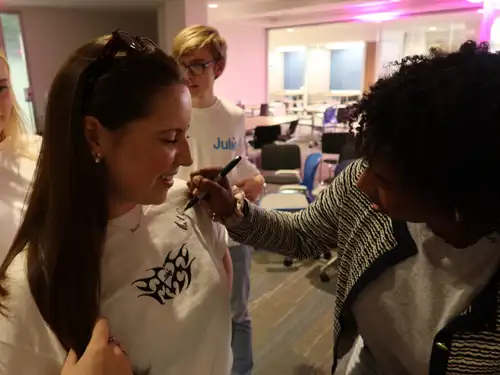
A student at trivia night asked Amanda E/J Morrison (right) to sign her Julie-branded T-shirt.
It was past 9 o’clock on a weekday, and the competition at trivia night was heating up. Students in teams of two or three screamed with delight as they watched their names climb the leaderboard. They competed to win prizes like sex toys and T-shirts with the phrase, “A Better Morning After.”
“Morning-after pills end pregnancy. True or false,” the club president called out.
Thirty seconds later, the screen showed that every team had answered correctly.
Morrison pumped both fists in the air, beaming her approval.






